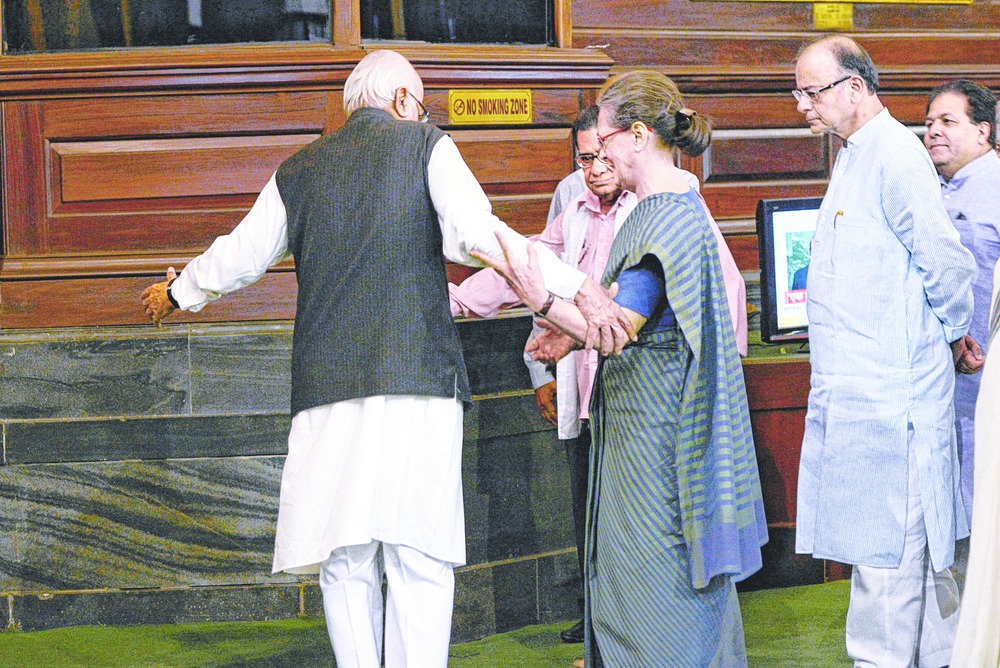
Oct. 2: If Narendra Modi has been wondering what was up the Congress's sleeve, he can breathe easy.
Congress supporters wallowing in despair and praying for a Brahmastra to counter Modi were today presented with Buta Singh.
The 81-year-old Buta, who has had his share of controversies that critics say reflect everything that is wrong with "the Congress culture", was re-inducted into the party today.

The ostensible reason for the timing of the homecoming was to help out the Grand Old Party in election-bound Bihar and, subsequently, in Punjab.
But several Congress leaders were scratching their heads to figure out if the reinduction of leaders like Buta is the leadership's idea of "reviving" the party.
Buta comes with burdensome baggage. His son Sarabjot Singh was under the CBI scanner in August 2009 for allegedly demanding a Rs 1-crore bribe by milking his father's then position as chairperson of the National Commission for Scheduled Castes.
Buta's stint as governor of Bihar in 2005 had landed the then UPA government in such embarrassment that then Prime Minister Manmohan Singh had to plead with President A.P.J. Abdul Kalam not to resign.
Bihar had come under President's Rule on March 7, 2005, after the Assembly elections threw up a fractured verdict. The Assembly was kept under suspended animation but Buta, who was the governor, recommended the dissolution of the House.
The Supreme Court later ruled that he had misled the Union cabinet because he did not want Nitish Kumar's Janata Dal (United) to form the government with the BJP.
In his book, Kalam mentioned an episode involving Manmohan, a scene apparently so "touching" that the former President "did not want to describe it".
In October 2005, Kalam told Manmohan that he would step down following the Supreme Court's adverse verdict. The apex court had described the presidential proclamation dissolving the Bihar Assembly (issued on the advice of the Raj Bhavan) as unconstitutional and "mala fide".
"As soon as the verdict was known, I wrote a letter of resignation, signed it and kept it ready to be sent to the Vice-President, Bhairon Singh Shekhawat," Kalam wrote in his memoirs published after he ceased to be the President.
"The Vice-President was away. Meanwhile, the Prime Minister came to see me for some other discussion. I said I have decided to resign and showed him the letter. The scene was touching and I do not want to describe it. The Prime Minister pleaded that I should not do it at this difficult time. He said that as a result of the furore that would be created, even the government may fall."
Few details were known about this episode, although suggestions were then made that the Prime Minister turned "very emotional".
Kalam said the following 24 hours were extremely difficult for him. "Conscience is the light of the soul that burns within the chambers of the heart. That night I could not sleep. I was asking myself whether my conscience is important or the nation more important. The next day, I did my early morning namaz as usual. Then I took the decision to withdraw my decision to resign and not to disturb the government."
On January 26, 2006, Buta faxed his resignation to the President. Once the dust settled down, Sonia and Manmohan appointed him chairperson of the commission, according him cabinet status and a palatial house in Delhi.
Prior to this, Buta was convicted in 2000 of bribing MPs to vote in favour of Narasimha Rao's minority Congress government. He was, however, cleared of the charges in 2002.
In the 2009 parliamentary polls, Buta contested as an Independent from Jalore in Rajasthan and lost. In 2014, too, he contested and lost as an Independent.
Buta insists he has been with the Congress all along. He was among those who stood by Indira Gandhi after the party split in 1977-78.
Amid an acute resource crunch, Buta, then an AICC general secretary, used his clout among taxi operators to let the party use a fleet of cabs, mostly for free. He was also known for organising food, sometimes falling back on community kitchens to feed the hungry party ranks.
(The Congress's political fortunes are at a low now but there is no dearth of BMWs and Mercedes cars zipping in and out of the 24 Akbar Road headquarters in New Delhi.)
Hailing from a modest background, Buta started his political career as an Akali. Before that, he was a Marxist who did his MA in history from Mumbai's Khalsa College. When Josef Stalin died in 1953, Buta is said to have wept bitterly.
During the Rajiv Gandhi era, Buta worked as a virtual No. 2 in the government, upstaging senior ministers P.V. Narasimha Rao and P. Shiv Shankar. He had more access to Rajiv than any other minister.
Buta loved his reputation as Rajiv's "axe man". Between 1985 and 1989, he toppled many state governments as Union home minister.
But he changed loyalties too fast, joining the BJP and then returning to the Congress.











